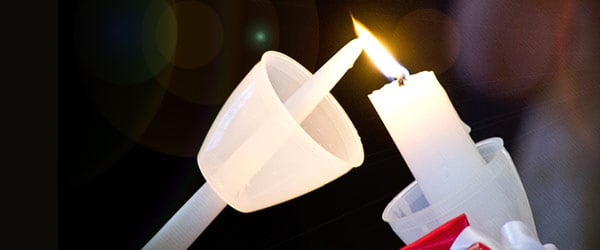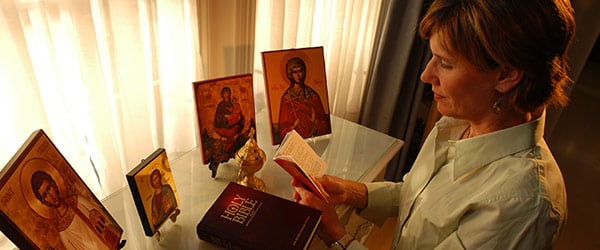Baltimore, MD - From hunger to hope, and from hope to opportunity.
That's how Bert Moyar, board chairman of International Orthodox Christian Charities (IOCC), describes the impact of IOCC in the former Yugoslavia over the past 10 years.
Moyar and his wife, Marjorie, recently completed a trip to the Federal Republic of Yugoslavia (Serbia and Montenegro) and Bosnia-Herzegovina on behalf of IOCC, the official humanitarian aid agency of Orthodox Christians.
"(IOCC) came there to fight hunger and to distribute food and medical supplies," Moyar said. "We have helped many people along their journey from hunger to hope, and now we are giving aid to those who are housed and fed, so that they may build lives of economic self-sufficiency."
Since 1992, IOCC has delivered more than $50 million in relief and development assistance to people of all ethnic and religious backgrounds in the former Yugoslavia - enabling the return of refugees, creating opportunity for returned families, reconciling neighbors and communities, and meeting people's immediate needs.
Still, Moyar said Serbia is faced with an enormous humanitarian challenge as it struggles to resolve the fate of the estimated 620,000 refugees and displaced persons within its borders, some displaced by the 1999 crisis in Kosovo and many others by the earlier conflicts in Croatia and Bosnia-Herzegovina. Together, they constitute the single largest refugee community in Europe.
"Probably the most painful thing I saw were the people who are forced to live in these refugee shelters," he said. "Some of them have lived there for 10 years, since they were forced from their homes. Some of them are without hope. They don't see a way out. They know they're not going to go back to Croatia. And they're afraid to go back to Kosovo."
The return of displaced persons, mostly Serbs and Roma, to Kosovo remains an elusive goal of the international bodies charged with the administration of Kosovo in the wake of the 1999 NATO bombing campaign. Most want to return but need the international community's help to provide a secure environment and the necessary living conditions.
During the Serbian portion of their trip, the Moyars met with His Holiness Patriarch Pavle of the Serbian Orthodox Church and His Grace Bishop Artemije of the Diocese of Raska and Prizren (Kosovo and Metohija), who have given their blessings to IOCC's humanitarian work.
Bishop Artemije stressed the need for IOCC to advocate on behalf of displaced persons eager to return to Kosovo. About 85 percent of the Serbs who lived in Kosovo before 1999 now live in Serbia proper, creating a humanitarian problem with little sign of improving. Those who remain in Kosovo suffer from a lack of mobility and security, making military protection necessary.
"There are a multitude of humanitarian organizations in Kosovo, however, most do not go into the Serb enclaves. Therefore, the Serbs feel ghettoized," said the Rev. Irinej Dobrijevic, another IOCC board member, who was in Kosovo for the Christmas holidays. "This sense of isolation can be greatly alleviated by opening the doors to the outside world through aid which comes from fellow Orthodox Christians."
IOCC has been active in Kosovo since 1992. During the NATO bombing campaign of 1999, IOCC was one of only three relief organizations to maintain an operational presence in the region, providing continuous humanitarian assistance to refugees and displaced persons in Serbia and Montenegro.
More recently, IOCC has done small-scale projects in Kosovo through its office in Podgorica, Montenegro, and the Visoki Decani Monastery, as well as supporting Bishop Artemije's soup kitchen in the eastern part of the province.
The Moyars also met with officials of the U.S. and local governments. Both William Montgomery, U.S. ambassador to Yugoslavia, and Clifford Bond, U.S. ambassador to Bosnia, praised IOCC's 10-year record in the region and expressed concern over the lingering effects of the 1990s conflicts.
"The world is turning away to concentrate on other problems, and aid money is drying up," Moyar said. "The people there feel forgotten by the world."
The Moyars' visit took them to Belgrade, Serbia, and outlying areas, where they witnessed the desperate conditions at refugee centers and the good works of IOCC and partners such as Philanthropy (Covekoljublje), the humanitarian arm of the Serbian Orthodox Church. They also traveled to Banja Luka, Bosnia, where IOCC's "intensive and diversified" program covers all aspects of refugee return, and Sarajevo, where the scars of war are still evident.
Also visiting the region recently was IOCC board member Leonidas "Lee" Kapetanakis, who said that IOCC's experience in Serbia and Bosnia would serve it well as it seeks to repatriate people displaced from Kosovo.
"Kosovo is a place where we absolutely have to be," he said. "The need there is tremendous."
Kapetanakis, who traveled to Kosovo on behalf of IOCC, said the international community is starting to show an interest in the return of all nationalities to Kosovo. "IOCC ought to be part of that effort," he said. "The world has lost a lot of its interest in the Balkans. It's incumbent on IOCC to try to maintain focus there."
Fr. Irinej agreed. "Kosovo is still a fresh wound compared to the rest of the region," he said.
CONTACT:
Stephen Huba
Communications Associate
1-877-803-IOCC (4622)
(410) 243-9820, ext. 28
[email protected]


